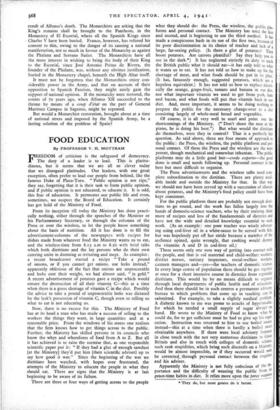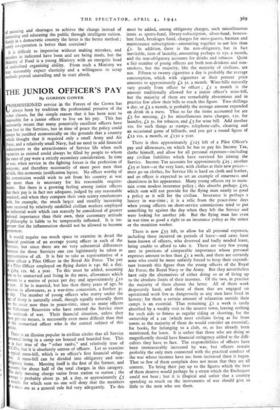FOOD EDUCATION
By PROFESSOR V. H. MOTTRAM
FREEDOM of criticism is the safeguard of democracy. The durSt of a leader is to lead. This is platitu- dinous, but it seems that we are all so clever today that we disregard platitudes. Our leaders, with one great exception, often prefer to lead our people from behind, like the famous Duke of Plaza-Toro. " Public opinion is not ripe," they say, forgetting that it is their task to form public opinion, and if public opinion is not educated, to educate it. It is odd, this fear of education. It permeates our public life and even, sometimes, we suspect the Board of Education. It certainly has got hold of the Ministry of Food.
From its inception till today the Ministry has done practi- cally nothing, either through the speeches of the Minister or his Parliamentary Secretary, or through the columns of the Press or over the wireless, to let the people know something about the basis of nutrition. All it has done is to fill the advertisement-columns of the newspapers with recipes for dishes made from whatever food the Ministry wants us to eat, and the wireless-time from 8.15 a.m to 8.20 with brief talks which both dietitians and the lay persons who do their own catering unite in damning as irritating and inept. As examples: a recent broadcaster started a recipe " Take a pound of onions, or if you cannot get onions, use leeks instead," apparently oblivious of the fact that onions are unprocurable and leeks cost their weight, we had almost said, " in gold." A recent advertisement of potatoes gave a recipe which would ensure the destruction of all their vitamig C—this at a time when there is a gross shortage of vitamin C in the diet. Possibly the advice to take a pound of unprocurable leeks was dictated by the leek's possession of vitamin C, though even so telling us what to eat is not educating us.
Now, there is no excuse for this. The Ministry of Food has at its head a man who has made a success of selling to the workers the things they want, in large quantities and at a reasonable price. From the windows of his stores one realises that the firm knows how to get things across to the public. Further, the Ministry has skilled persons in its councils who know the whys and wherefores of food from A to Z. But all it has achieved is to raise the surmise that, as one responsible scientific paper put it: " If they had a glut of enough sawdust [at the Ministry] they'd put him [their scientific adviser] up to say how good it was." Since the beginning of the war we dietitians have watched, with hopes ever frustrated, the attempts of the Ministry to educate the people in what they should eat. There are signs that the Ministry is at last beginning to be aware of its failure.
There are three or four ways of getting across to the people what they should do: the Press, the wireless, the public plat- forms and personal contact. The Ministry has used the first and second, and is beginning to use the third method. It has made a conspicuous hash in its use of the first two, because of its poor discrimination in its choice of teacher and lack of a large, far-seeing policy. (Is there a glut of potatoes? Then boost potatoes. Are carrots plentiful? Say they help you to see in the dark.*) It has neglected entirely its duty to teach the British public what it should eat—it has only told us what it wants us to eat. It has not told us how to make up for the shortage of meat, and what foods should be put in its place. (It has, fatuously enough, suggested potatoes, which are a hopeless equivalent.) It has not told us how to replace dieteti- cally the orange, grape-fruit, tomato and banana in our diet, nor what important vitamin we used to get from pork, ham and bacon, and what foods will put that vitamin back in our diet. And, more important, it seems to be doing nothing to prepare the public for the necessary change-over to a diet consisting largely of whole-meal bread and vegetables.
Of course, it is all very well to snarl and point out the shortcomings of the Ministry. (" Don't shoot the man at the piano, he is doing his best.") But what would the dietitians do themselves, were they in control? That is a perfectly fair question. As said above, there are four means of approach to the public : the Press, the wireless, the public platform and per- sonal contact. Of these the Press and the wireless are the most potent, though mechanical and somewhat inhuman. The public platforms may do a little goOd bat—crede experto—the good done is small and needs following up. Personal contact is the best but most difficult to organise.
The Press advertisements and the wireless talks need com- plete subordination to the dietitian. There are plenty avail- able inside and outside the Ministry for that. In that way we should not have been served up with a succession of idiocies about potatoes, and the Ministry's food policy could have been kept consistent.
For the public platform there are probably not enough dieti- tians to go round, and the work has fallen largely into the hands of domestic-science teachers, who by their training think more of recipes and less of the fundamentals of dietetics and have not the wide and detailed knowledge essential to such work. (As an example: one poor teacher was wisely advocat- ing using cod-liver oil in a white-sauce to be served with fish. but was hopelessly put off her stride because a member of the audience opined, quite wrongly, that cooking would destroy the vitamins A and D in cod-liver oil.) There seems only one sure way of getting into contact with the people, and that is via maternal and child-welfare workers, district nurses, sanitary inspectors, social-welfare workers, canteen managers and—yes—the teachers of domestic science. In every large centre of population these should be got together at once for a short intensive course in dietetics from reputable dietitians. This would be by no means difficult to organise through local departments of public health and of education. And then there should be in such centres a permanent advisory bureau to which problems that come up in teaching can be submitted. For example, to take a slightly medical problem. A diabetic known to me was prone to attacks of hyperinsulin, for which he needed a small supply of sugar always-- un hand. He wrote to the Ministry of Food to know what he could do, for to get sufficient meat he had to give up his sugar ration. Instruction was returned to him to use boiled sweets instead—this at a time when there is hardly a boiled sweet obtainable anywhere. If there were local advisory bureaus in close touch with the not very numerous dietitians in Great Britain and also in touch with colleges of domestic science, such rank stupidities, which bring such discredit on a MinisrlY' would be almost impossible, or if they occurred would som be corrected through personal contact between the enquirer and his adviser.
Apparently the Ministry is not fully conscious of the M) portance and the difficulty of weaning the public from its peace-time habits in diet. It relies more upon die force inciewe
* They do, but most greens do it better.
of rationing and shortages to achieve the change instead of interesting and educating the public through intelligent tuition. sorely in a democratic country the latter is the better method ; sorely co-operation is better than coercion?
It is difficult to improvise without making mistakes, and mistakes as indicated have been and are being made, but the Ministry of Food is a young Ministry with an energetic head of undoubted organising ability. From such a Ministry we may reasonably expect elasticity and a willingness to scrap methods proved unavailing and to start afresh.



























 Previous page
Previous page